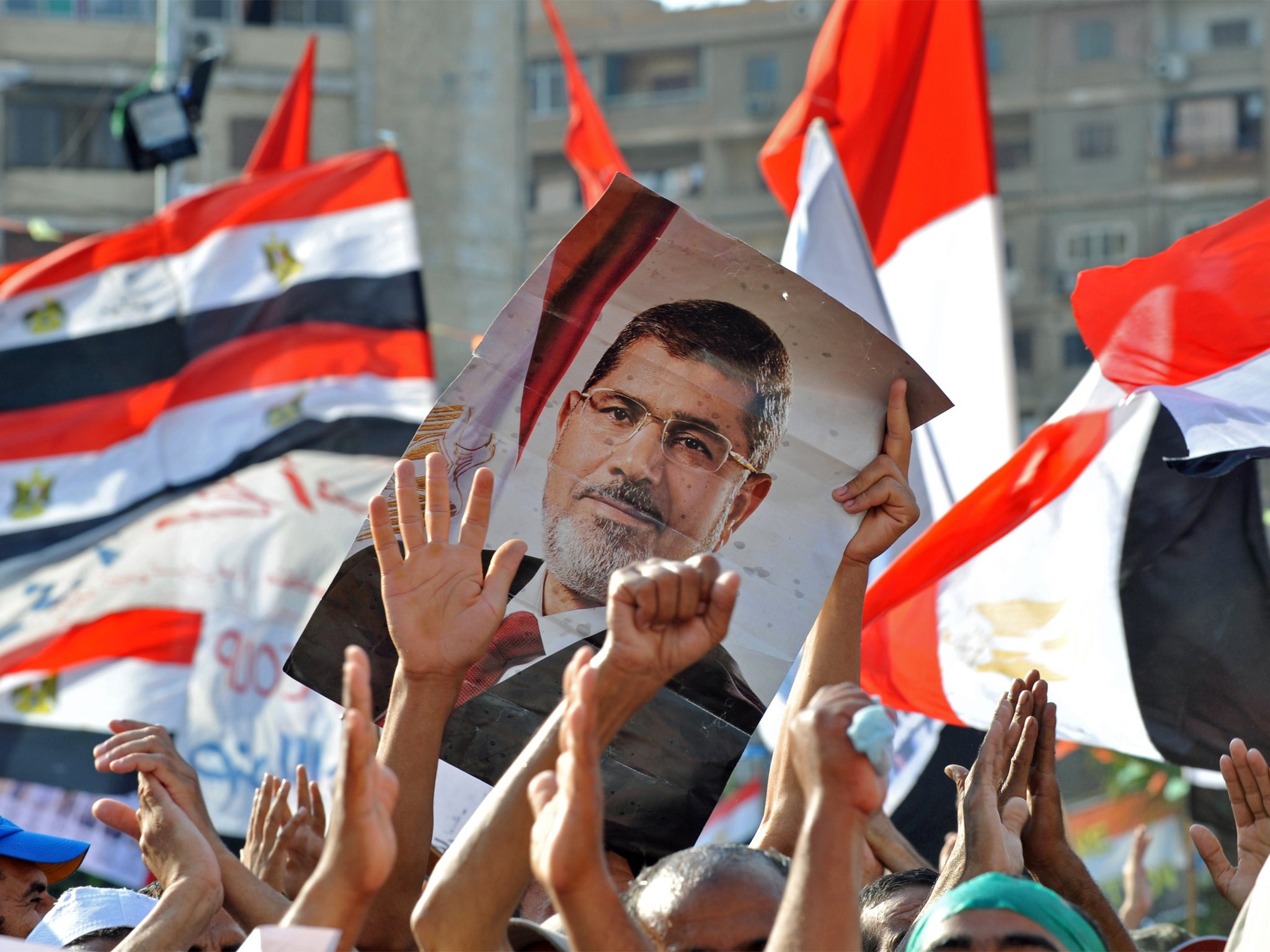The Egyptian army wants to destroy the Muslim Brotherhood – but in many ways they are already history
Many see the Brotherhood’s defeat as the beginning of the end of the Islamist ideology


When a general asks the people to go on the streets to show their support for the army in its battle against “violence”, it could be a very dodgy day. Tens of thousands of Muslim Brotherhood supporters remain camped across Cairo and other Egyptian cities – “terrorists” is the tired but dangerous code word that General Abdul-Fattah el-Sisi used about them yesterday – and at first reading his appeal looked like a call to the Brotherhood’s opponents to destroy what have in effect become “no-go areas” in Nasr City and Giza. The Egyptian press, ever ready to echo the general’s words, now uses “terrorism” with ever increasing promiscuity and el-Sisi’s demand for mass demonstrations in Egypt tomorrow raises some very disturbing questions.
Having been fingered for the massacre of Brotherhood members earlier this month, the army are in no mood for a repeat performance. So does General el-Sissi, self-declared Deputy prime minister, Defence minister and leader of the coup-that-wasn’t-a-coup want “the people” to do the army’s dirty work and storm into the Brotherhood’s tent encampments tomorrow? Or does he feel that the United States and Europe – who were not terribly keen on the coup-that-wasn’t-a-coup – will acknowledge the popularity of the military if millions of Egyptians return to Tahrir Square to give a further imprimatur to the army’s takeover?
El-Sisi’s talk of “terrorism” was principally referring to the daily attacks on Egyptian soldiers in the Sinai peninsula, which appear to be more the work of al-Qa’ida affiliates, smugglers and tribal leaders than any involvement by the Brotherhood. But for the moment, the existence of the Brotherhood’s camps – a ghostly mockery of the 2011 encampment that became the centre for the overthrow of Mubarak – are a constant reminder of the army’s failure to crush the movement and the Brotherhood’s continued demand to re-install Morsi. The army can bring out the people, to be sure, but what is the future of the Brotherhood itself?
Many are those who see its defeat as the beginning of the end of the Islamist “ideology”, the idea that Islam alone can right the wrongs of the world if only it was allied to political power. As Hussein Ibish, one of the most eloquent Arab columnists today, has said: “If the oldest Muslim Brotherhood party cannot maintain popular legitimacy in Egypt after only one year in office, then the ideology itself isn’t a practical model for governance anywhere.” Ibish’s line is simple: “Sunni Islamists will invariably fail in power because Islam is a religion and not a political ideology.”
It’s a bright idea, but even in the Islamic Republic of Iran – Shia, to be true – the opposition doesn’t want to destroy the Muslim foundations of their state. And the Saudi monarchy, constructed on the twin pillars of wahabism and the American dollar, is not going to deny its role as protector of the Two Holy Places. And after all, it’s not many centuries ago that the people of Europe regarded themselves as citizens of a place called “Christendom”. However politics develops, the church and the mosque and the synagogue have a habit of taking sides in national debates. The division of church and state – in France, for example – seems a very unnatural schism when you arrive in the Muslim world.
The reason is clear: Muslims – unlike the world of “Christendom” – have not lost their faith. This has in some way to be represented in the nations in which Muslims live. The challenge is whether slogans like that of the Brotherhood – “Islam has the answers” – really work. The “interim” Egyptian government, for example, has just discovered that Morsi’s administration underestimated the import of wheat necessary to sustain the population. The Koran cannot be eaten. Bread can.
These troubling equations are ever-present in the Muslim world. Many is the time I have woken in Cairo to read a diatribe in the Egyptian press about the sins of the US – often well-argued and absolutely true – but on travelling across the Nile, I have in the past found queues of Egyptians outside the US embassy, not protesting but waiting patiently in the oven-like heat. The message is obvious. The Koran is an important document. But so is a green card.
Religion is fine if we are talking about faith and values, but not so useful if we are discussing what Ibish calls “the detailed, technical problems of governance.” That, at least, is the story we are being fed by the Egyptian army and its supporters; that once Morsi picked up his 51 per cent of the presidential vote, he cared less about running Egypt than he did about empowering the Brotherhood itself. The Islamist “constitution” was to be proof of Muslim rule rather than Egyptian rule. And this led to further mistakes. Hence he could visit Muslims who had suffered from food poisoning, for example, but fail to visit the Coptic pope when Christians had been shot dead in the streets.
Ibish sniffs what he calls “a post-Islamist brand of politics in the Arab world”. I’m not so sure he’s right. When Mohamed Khatemi became president of Iran – a genuinely honourable man (one of the very few in the Middle East) – he talked of an Islam that would produce a “civil society”. Only America’s refusal to tolerate him brought us the dunderhead Ahmedinejad. The problem, I fear, is that the alternative to Islam as an ideology – which it is not – will turn out to be capitalism and superpower politics which will go on supporting corruption in Saudi Arabia and generals who call on people to demonstrate for armies which have staged coups that we cannot admit ever happened. And to encourage the use of that corrosive word – “terrorism”.
